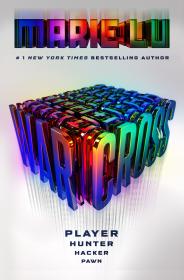Lu’s legacy
“Warcross” finale brings new feelings

October 23, 2018
Marie Lu has quickly turned into one of my favorite authors over the past few years, and as I finish her latest “Warcross” series, I’m definitely left with new thoughts. The final book still had that recognizable quality I often find myself obsessing over, but it had parts that left me underwhelmed.
To quickly summarize the important concepts of the first novel, it begins with the main character: Emika Chen. As a virtual reality bounty hunter in New York City and prodigy hacker, she manages to glitch her way into the world-competition for famous virtual reality game, Warcross. She’s then shocked to receive a call from the creator of the game, Hideo Tanaka, with a tempting offer: to go undercover in the virtual tournament in order to find a security problem with the game. Lu’s “Warcross” provides great ideas and the perfect setup of a bigger world that had me excited for the sequel.
The first installment of the series is commonly seen as more popular and more enjoyed by the audience when compared to the sequel. Last year, “Warcross” quickly became one of my favorite books of 2017. One of the reasons, as the title of the book magnifies, is the game itself: Warcross was so much fun. It quickly became one of the most exciting and interesting portions of the story to me, with electric scenes that made me wish a game like this was available in the real world. For a while, I just wanted all of the book to be comprised of Warcross and its world-competition.
Also, it’s critical that Chen is mentioned, as she takes a turn for the worse later. I really liked Chen in the first novel; she was fun, cute and developed into something extremely interesting as Lu explained her backstory later on. Honestly, Chen interacting with the world and characters around her was one of the things that kept me invested in the novel when the world-competition wasn’t happening. As a nerd and a fan of esports, I could relate to Chen and her conversations with people in Warcross and generally found them to be some of the funniest moments.
Speaking of Chen, some of the relationships that are built around or with her are rather symbolic, and made for an enjoyable romantic story I didn’t expect to enjoy. The romance was surprisingly relevant in “Warcross,” and it was equally surprising that I was actually interested in it. This is not something I can say about many romances in novels, as I normally find them tedious and annoying in novels where they just become a bad side plot. But, of course, any time I complain about some general theme in novels, Lu proves to me that I can enjoy it. The relationships that grew between characters were especially meaningful with the addition of the backstories, which also proved to be incredibly interesting to read throughout the novel.
With an incredible idea for a game, and characters grouped together in a fantastic web of secrets and romance, my expectations could not have been higher for the sequel: “Wildcard.” While I certainly loved the novel, I also think a lot of opportunities created in the origin were thrown away when the sequel arrived.
First of all, the most obvious change is that the book immediately felt different than its origin. Not necessarily in a good or bad way, but the novel generally moved towards a darker tone that surprised me. Without mentioning any spoilers for “Warcross,” a turn of events changed Chen’s mindset into looking at a much larger picture. Personally, I like where this sequel moves because of one character: Zero.
Before talking about Zero, however, there are problems to bring up. Chen certainly decayed as a character throughout this novel, as she did not really feel like she was doing all that much. Without noting any specific scenes, I do think that she had little impact on everything that was going on. She would go to some type of event to interact with another character, that other character would probably say something, and then Chen would leave. It bothered me how she barely did anything besides, apparently, be important to other characters.
Because the series moved towards Zero’s story and Tanaka’s decisions, it sadly moved away from the esports and Warcross ideas also. While I am certainly disappointed that Lu did not give more from that setting, I think where she moved the story with other characters was really enjoyable.
Now, it’s time to discuss the savior of this series: Zero. Giving “Wildcard” time to explain Zero’s backstory was a great idea, and it was a pleasure to read. I could see Lu’s genius worldbuilding all over Zero’s backstory and execution, and I loved it. His development and secrets made him a great mystery and something to look forward to as I continued the novel.
And, of course, there’s the ending. Oh my, the ending. How Marie Lu knows how to break my heart and piece it back together every time I pull out a book of hers blows my mind. The ending of “Wildcard” was heartwarming and blood-pumping in all the best ways. What I assume to be the conclusion brought together one of the best chases and conflicts I had seen in this series, and the final thoughts sent a chill through my bones and tears down my eyes over a bright smile of satisfaction. Marie Lu should be congratulated for writing two finales that have turned a series into its best for me: “Champion,” and now “Wildcard”.
Overall, I do see why most people enjoyed the first book over the second, but this is where my stance deviates from the norm. For me, the emotional and heart-melting moments of the second novel won over a lot of the characters, and Zero was one of the most fantastic side stories.
If you want a story that drops you face-first into an incredible world of games, lovable characters and secrets, then the first book is likely enough for you. However, if you are prepared to see more of the characters and less of the game, then pull out a tissue box and dive into “Wildcard.” With my personal favorite of the two being the second, Marie Lu does it again for me.

